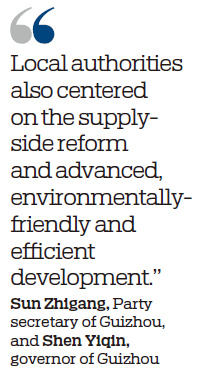Poverty alleviation boosts economic, social development
Authorities from Guizhou in Southwest China see poverty alleviation as a direct way of serving the people.
The previous provincial Party committees and governments led local officials and residents to promote economic and social development.
The province's urban and rural landscapes have changed radically since the founding of the People's Republic of China in 1949.
The province saw its GDP reach 1.48 trillion yuan ($208.7 billion) and a per capita GDP hit 41,244 yuan in 2018, which were 2,377 and 937 times the respective figures in 1949.
The per capita disposable income of urban and rural residents was 31,592 yuan and 9,716 yuan respectively last year, 336 times and 201 times the tallies in 1949.

Highway mileage in the province was 196,900 kilometers in 2018, 101 times that in 1949. Expressway mileage was 6,453 km and high-speed railway mileage reached 1,262 km last year.
Local authorities have prioritized poverty alleviation and focused on infrastructure and construction in rural areas by developing industries that included the improvement of education, healthcare and housing.
They have built pitch and cement roads extending about 80,000 km in rural areas, facilitating 12 million people living along the roads.
They restructured local agriculture, reduced farming of inefficient crops such as corn and developed efficient industries such as vegetables, tea and edible fungus.
The low-income population in the province was reduced from 6.23 million in 2015 to 1.55 million in 2018.
Local authorities also centered on the supply-side reform and advanced, environmentally friendly and efficient development.
Authorities have promoted a project aiming to transform about 1,000 industrial companies and attract about 1,000 companies to develop in Guizhou.
The province also implemented the big data strategy and promoted development of the national big data comprehensive pilot zone.
It resolved debt risks and maintained a steady and continuous momentum for economic development.
Forest coverage rate in the province increased to 57 percent in 2018 and good air quality days reached 98.2 percent on average in Guizhou's counties.
Local officials put employment in a prominent place and launched a three-year action plan training farmers from 2019-21.
Last year saw the creation of 780,000 jobs in urban areas. They also realized remote diagnosis and treatment in cities, counties and even townships, making it easier for people in mountainous areas to access medical services.
Sun Zhigang is Party secretary of Guizhou and Shen Yiqin is governor of Guizhou.
(China Daily 09/30/2019 page18)














